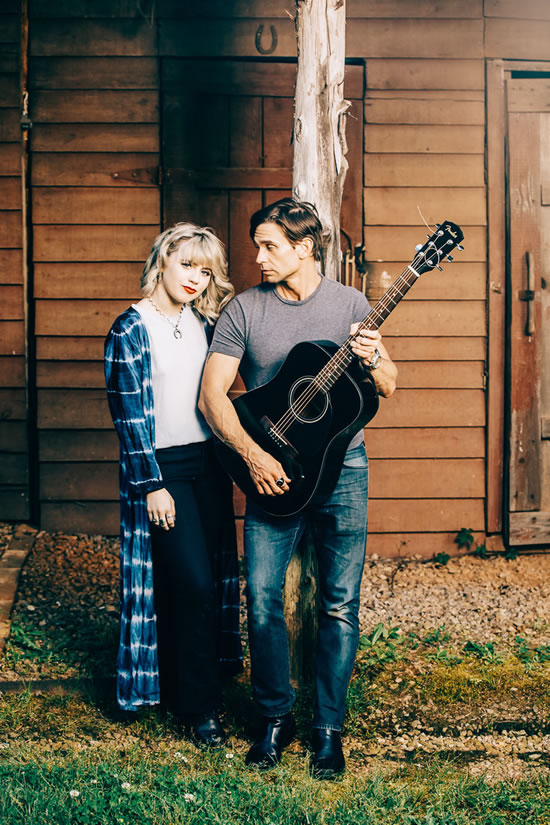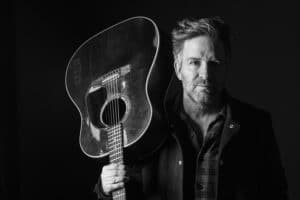Addiction serves as a catalyst for the beautiful darkness of Nocturnal Blonde

All photos courtesy of Rachael Renee Levasseur
Addiction serves as a catalyst for the beautiful darkness of Nocturnal Blonde
Richie Williams was 17 years old when he first noticed his brother’s descent into the depths of addiction.
 Since their childhood in Jacksonville, Fla., the two had been thick as thieves; best friends then and now, but Dave’s drug use began to steal Richie’s older sibling, with the slow assuredness of guaranteed destruction.
Since their childhood in Jacksonville, Fla., the two had been thick as thieves; best friends then and now, but Dave’s drug use began to steal Richie’s older sibling, with the slow assuredness of guaranteed destruction.
Looking back, Richie — who now leads the Athens, Ga.-based band Nocturnal Blonde, which draws on music the two brothers created to tell Dave’s story and light a beacon of hope for those who might similarly struggle — sees that his brother’s path was, in some ways, no surprise.
“He’s incredibly intelligent in a lot of ways, and in the ’80s, they had a gifted program where they would really just lay it all out for you,” Richie told The Ties That Bind Us recently. “They would give you an IQ test and tell your parents what your personality was going to be, and they told our parents that he was only going to see things in black-and-white. This is pretty much a direct quote from my memory — they said he could either end up working for NASA, or end up in a ditch.”
Dave didn’t end up in a ditch, but he came close. An overdose several years ago brought on respiratory failure, which led to acute ischemia, a stroke that damaged his brain. He’s alive, but he’s forever changed, and when a part of him died, a part of Richie did as well. Nocturnal Blonde, his band with Rachel Adams, was his own way back into the light. The band has released an EP, “Smart Heart,” which will become part of a full-length song cycle that gives listeners a glimpse into the wastelands from which his brother almost didn’t return.
“I want them to understand the dark side of it,” Richie said. “We’re not an anti-party band. This material addresses the souls who never actualize the concept of moderation, such as my brother. It’s like he was competing for a medal in the ‘Drug Olympics.’”
A brotherly bond forged in music
 For the Williams brothers, music has been one of the primary ties that bound them as siblings and friends. Richie remembers being 4 years old and listening to “Us and Them” by Pink Floyd in the den with their father and the sounds of that song opening a door within his head and heart.
For the Williams brothers, music has been one of the primary ties that bound them as siblings and friends. Richie remembers being 4 years old and listening to “Us and Them” by Pink Floyd in the den with their father and the sounds of that song opening a door within his head and heart.
“It hit my pleasure center so hard, and I remember thinking, ‘That’s a world, that’s a building, that’s a city, all in a sound,’” he said. “My dad used to actually play with Chet Atkins a little bit when he was a really young kid on the guitar, and I just had no choice but to pursue music. I was immersed in it.”
As the brothers got older, the two began writing and playing together, and the pair eventually moved to the college rock incubator town of Athens. After a stint in the power trio Commander Chameleon, Richie joined his brother, his cousin and two best friends in The Shrinks. They wrote and recorded material and got started playing live, but by that point, Dave’s problem began to take precedent.
“We played four shows, and we were really going to be something, but he just fell off the map,” Richie said. “His music just opened so many doors for me, and the connection was still there as my brother, but he just kept getting deeper and deeper into anything he could just to feel good at the moment. The music was huge and hard to capture, because he couldn’t get it together, but whenever we did, we kept it.”
Some of that material made its way to Lynda Stipe, the sister of Michael Stipe, singer and frontman for the now-defunct Athens-based jangle-pop juggernaut R.E.M. A mutual friend passed a CD of the Williams brothers’ tunes to Lynda, and she reached out to propose a collaboration.
“Lynda and I got Michael’s attention with the stuff that we ended up writing together, and I became good family friends with them,” Richie said. “It took a year or two, as he had just retired from R.E.M., but when he came back from doing whatever it is big rock stars do, he came home (to Athens) and said, ‘OK, I’ve got to get you guys in the studio.’”
The band became known as Flash to Bang Time, and for one track, Richie received some lessons about songcraft from Michael Stipe himself, he said.
“There was one song he really liked and wanted to sit with me and go over, so he and I went in a room together and took a 5-minute song, and he said, ‘What do you think about this as an ending?’” Richie said. “He handed me something he just wrote out, and it just made the song perfect. What I learned in that month just blew me away, and I think maybe I started seeing things through Michael’s filter a little bit.”
A bond is broken
 Personal challenges for the Stipe family mean that the Flash to Bang Time album is still on the shelf, but Richie left those sessions inspired about his potential solo work. However, his brother’s addiction began to occupy more and more of his energy and concern.
Personal challenges for the Stipe family mean that the Flash to Bang Time album is still on the shelf, but Richie left those sessions inspired about his potential solo work. However, his brother’s addiction began to occupy more and more of his energy and concern.
In 2016, Richie arranged for an intervention to get Dave into treatment in Athens. The plan was for Dave to return from a visit back to Florida and enter the treatment program directly, but he slipped the net and disappeared. About a week later, their father called.
“My dad said he had overdosed, and they had the sheet covering him and everything,” Richie said, pausing against the well of emotions those searing memories entail. “He was beyond blue, and when I got the call from my father, they were actually taking him away. But somehow, 11 minutes into a 20-minute ride, he came through.”
It was a call Richie had long dreaded but still expected, and his world came crashing down around him. He suffered his own nervous breakdown, wondering if his brother would ever be the same. Almost three weeks later, Dave called from the hospital.
“It was like a phone call from beyond the grave,” Richie said. “But he remembered the number, and he dialed it, and within a week, I was playing music again. That’s always been our main bond, and now I’m coming back with a force.”
Nocturnal Blonde was born when Richie met Rachel in December 2017. She grew up outside of Athens, and her earliest memories of music are of sitting on the front pew of churches around the area, listening to the Southern gospel quartet of which her father was a part. Music has been a part of her life ever since, and when she discovered the music Richie and Dave had created, she knew that she could bring something to it.
The first time Richie heard her sing, he knew as well, he added.
“She’s not an angel, but man, her voice is,” he said. “She’s my absolute best friend and my partner in crime and music.”
“When we met Richie told me he was trying to get something started and asked if I wanted to listen to the music, so I did,” Rachel added. “He gave me three songs, and I knew there was something about them that I wanted to add to. And then when he told me the story, it was kind of like, ‘Wow — that’s why these songs have so much depth and so much meaning!”
Music remains the bedrock
 After three meetings, the two were a band; in February, they borrowed a line from the Syd Barett song “Feel” for a name and immediately went into the studio to work on “Smart Heart.” It’s gorgeous acoustic psych-folk, drawing on the dual harmonies of other male-female combos like Mandolin Orange and Carolina Story but wrapped in a patina of ache and darkness. It’s impossible to listen to the EP, however, without hearing the hope on the other side of that void.
After three meetings, the two were a band; in February, they borrowed a line from the Syd Barett song “Feel” for a name and immediately went into the studio to work on “Smart Heart.” It’s gorgeous acoustic psych-folk, drawing on the dual harmonies of other male-female combos like Mandolin Orange and Carolina Story but wrapped in a patina of ache and darkness. It’s impossible to listen to the EP, however, without hearing the hope on the other side of that void.
Because despite his brother’s stroke, Richie still has his brother. There are many whose stories are contained in Nocturnal Blonde’s songs who do not, and the music they make is for the ones lost and the ones who survive.
“I haven’t been the same since then, but Dave’s sound is still there,” Richie said. “I’ll call and talk to him about a song, and he’ll say it needs this or that in terms of color. He can’t drive, and he can’t work, and he falls a lot, but I get to bounce the ideas off of him, and because we’ve worked so long together, his presence is in there. It’s more than inspiration.”
Dave and Rachel struck up a close friendship — “We talk all the time, and text almost every day, and he’ll tell me if he thinks something would sound better or what I’m doing is perfect,” she said. “The two of them are so special, and the music is so special, and adding to it has been really fun for me.”
Although he’s forever changed, Dave is clean today. He went through treatment at an Athens area treatment facility, and he’s active in recovery, because the damnable part of his brain damage is that the part where his addiction lives is unaffected.
“He knows that he still craves, and if he has the opportunity and isn’t active in recovery, he would use,” Richie said. “But in terms of support, he has a program, and he uses the tools of the recovery center, and I can see it in his outlook that things have changed.”
And part of that support is Nocturnal Blonde. Dave lives vicariously through Richie and Rachel, and the two are very aware that the music made by a once-brilliant mind still has a role in healing hearts also damaged by addiction. They hope to move from the studio to the stage soon, but they’re not anxious to force anything. The band has been guided to date by a higher power, and shoehorning it to fit into a certain box would defy Nocturnal Blonde’s momentum.
Richie, Rachel and Dave have been through too much to allow that to happen, they said.
“I’m not trying to force it anymore,” Richie said. “I think the songs stand strong enough on their own. I want people to know just how dangerous it is to dabble with these particular substances, man. There’s a depth of isolation to it that I want them to feel, but I want them to know that there is inspiration as well. You don’t have to go to those places and lose yourself.”
Check Out These Other Artists' Stories






